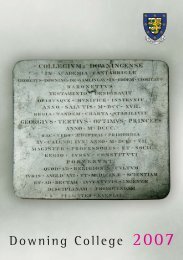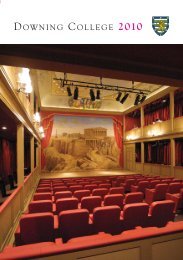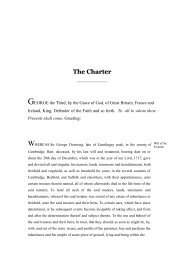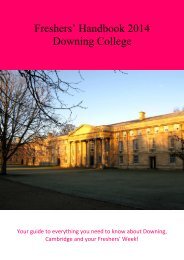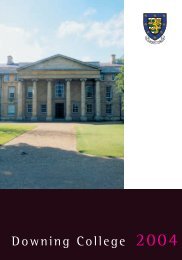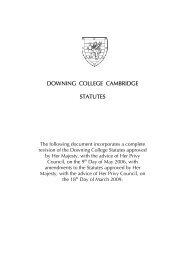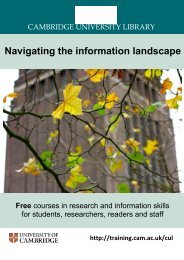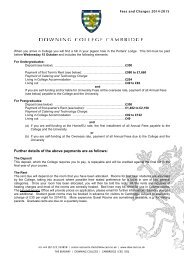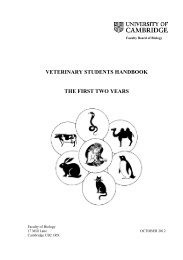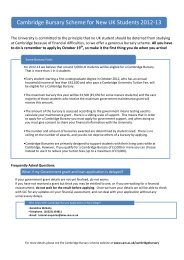downing text 2012_Layout 1 - Downing College - University of ...
downing text 2012_Layout 1 - Downing College - University of ...
downing text 2012_Layout 1 - Downing College - University of ...
- No tags were found...
Create successful ePaper yourself
Turn your PDF publications into a flip-book with our unique Google optimized e-Paper software.
DOWNING COLLEGE ASSOCIATIONalmost all <strong>of</strong> continental Europe in the early 1800s. But if you think that, thenyou would be wrong. Wrong emperor! Wrong century! In fact, wrongmillennium!! El codi is the code <strong>of</strong> the Roman emperor Justinian who died in565 AD. And if someone bashes in your car, an Andorran lawyer will tell you,quite unselfconsciously, that you must sue within a year under the lex Aquilia.That law dates from the early third century BC.Technically the basis <strong>of</strong> Andorran civil law is the local custom, as amendedby the 1993 constitution, by treaties and by legislation <strong>of</strong> the parliament, andthe co-princes before 1993. However, the two most authoritative 18th centurycollections <strong>of</strong> customs, the Manual Digest <strong>of</strong> Antoni Fiter I Rossell and the Politar<strong>of</strong> Antoni Puig, make it quite clear that, when there is no contrary local custom,Andorran law is the Roman Law as applied together with Canon Law inCatalonia before the New Basis imposed by Philip V <strong>of</strong> Spain in 1716.With significant help from my first Catalan teacher, who has become a goodfriend, I wrote my dissertation about how the forms <strong>of</strong> law were used tocircumvent laws. I started in Roman times by citing examples <strong>of</strong> the use <strong>of</strong> thefideicommissum, the Roman testamentary trust, which is still part <strong>of</strong> the law <strong>of</strong>Andorra. I then compared and contrasted the Anglo-American concept <strong>of</strong> thetrust with the fideicommissum, quoting Abdul Hameed v de Saram [1946] A.C.208. In looking for an <strong>of</strong>fbeat English example <strong>of</strong> evading laws by the forms <strong>of</strong>law, I remembered a scene set in the 18th century in Barnaby Rudge, ratherappropriate for this Dickens year. In that scene Mr Haredale, the rigidlyCatholic father <strong>of</strong> the heroine, reproaches Lord George Gordon: “Is it notenough, my lord, that I, as good a gentleman as you, must hold my property,such as it is, by a trick at which the state connives because <strong>of</strong> these harshlaws;…”. I had some difficulty finding the particular harsh law since, fortunately,no part <strong>of</strong> it is still in force. For those interested, it is section IV <strong>of</strong> An Act forthe further preventing the Growth <strong>of</strong> Popery (1699–1700 11 & 12 Will.III c.4). The means <strong>of</strong> evasion were, <strong>of</strong> course, the English trust.Finally I commented on the use <strong>of</strong> Andorran prestanoms (namelenders) who enable foreigners to be the effective owners <strong>of</strong> businesseswhich are, in principle, barred to foreigners. Looking at the decisions <strong>of</strong>the Andorran Superior Court, which since 2003 have been publishedonline (http://www.justicia.ad/web/php/organitzacio.php?orgPK=3), I was verypositively impressed with the quality and fairness <strong>of</strong> the decisions. I have beentelling the expatriate community here that it is by no means the case that theforeigner always loses. When a business goes bust and the foreign real ownercannot be found, it is the Andorran prestanom who has to pay the creditors <strong>of</strong>the business, irrespective <strong>of</strong> whether those creditors are foreigners or nonresidents,or both. All this is based on a bold interpretation <strong>of</strong> a principle known55



